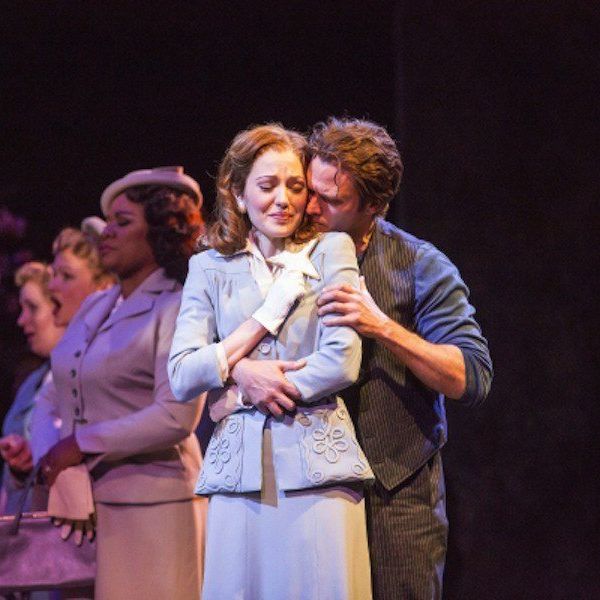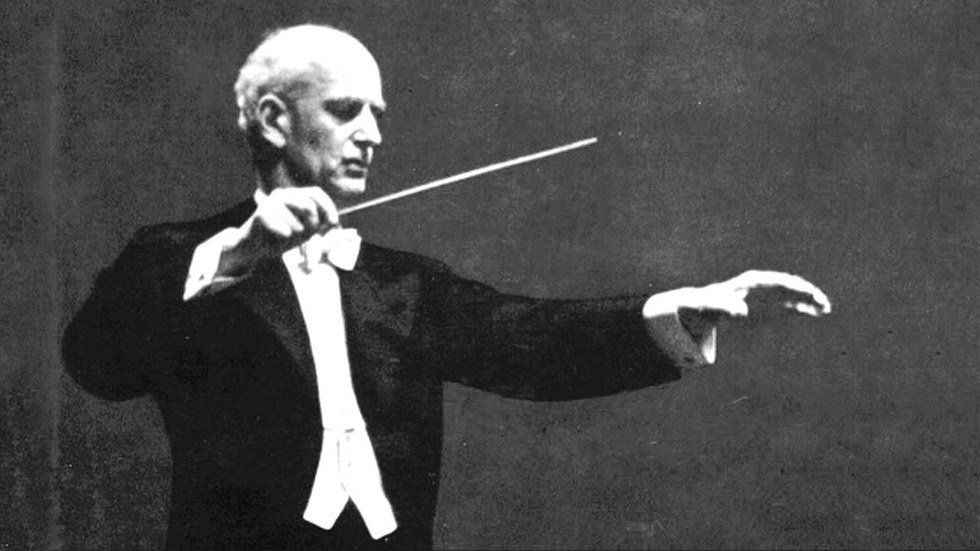Wilhelm Furtwängler was born January 25, 1886 in Berlin, Germany to an archaeologist father and a painter mother. Despite neither of his parents being musicians, he did receive a musical education, starting with playing piano when he was a young child. His early music education was due in part to his family’s friendships with musicians like Mendelssohn and Brahms. This education is what helped him develop his intense love of Beethoven’s work in particular, which would play a key role throughout his life.
Although primarily known as a conductor, Furtwängler also tried his hand at composing starting at a young seven and a half years old. People believed he would be a composer. Ultimately, he was unsuccessful in this venture, with only one real exception, and chose to focus on conducting instead.[1] He had his first chance to conduct a full scale orchestra when he was a mere twenty years old. Furtwängler held many prestigious positions throughout his career including, but not limited to, being the principal conductor of the Berlin Philharmonic, the Gewandhaus Orchestra, and for a period of time the Berlin Staatskapelle. He succeeded Arthur Nikisch in 1922 at the Berlin Philharmonic and the Gewandhaus Orchestra and Richard Strauss at the Berlin Staatskapelle. He was also appointed the permanent conductor of the Vienna Philharmonic in 1927 and he stayed there for three years.
Furtwängler reached world renown by his early forties and had received several honors including the German Order of Merit and an honorary doctorate from Heildelberg. Given the time period that Furtwängler lived in, World War II inevitably played an important role in a portion of his career. What occurred during this time period is one of two major points that have made his career controversial. Despite pressure to leave as the foremost German conductor at the time, he chose to stay in Germany, believing that he could make his own statement that way. He was infamously outspoken against the Nazi Regime and upset them on several occasions, two of which led to his temporary vacation of Germany. One of those times he negotiated with Hitler and his ministers so that he could continue to conduct and make music with his orchestra as long as he was allowed to do as he pleased musically. It was very important to him to not have politics involved in music as he believed that music should never be political.
Furtwängler is quoted as saying, “Art must have no truck with power politics, war, and hatred between nations.”[2] Furtwängler’s choice to stay in Germany backfired a little bit, however, because he had to undergo denazification trials after the war and the fall of the Nazi Regime in order to clear his name. He was officially cleared after his second trial in December of 1946, but the whole ordeal undoubtedly cast a shadow over his entire career.[3]
One point that is readily apparent is Furtwängler’s specific lack of pattern. When he conducts, oftentimes, it does not look like he is using a pattern of any kind, opting to simply keep general time with his baton. There are times when he appears to be either conducting the subdivisions or possibly adding some sort of expressive melding gesture because he is clearly not conducting the actual beats. This could be helpful as a musician if there are places where specific rhythms are difficult to count without subdivisions, but it could also be distracting. I think I would personally find it distracting. His bodily movements were often said to be “unconventional” by many, sometimes being described as a “puppet on a string”.[4] His left hand, while not limp, does seem to have a sort of extra flexibility as if it were attached to a string. He gave the composer’s intentions the highest regards and even though he was frequently criticized for being imprecise in his movements, he was never imprecise just to be so. He always did it because he believed the composer wanted him to be that way in specific circumstances.[5]
Of course, this put him at odds with conductors like Toscanini who hated how technically imperfect everything he did was, while Furtwängler hated how excruciatingly precise Toscanini was. The arguments over his imprecision turned out to be the other major controversy of his career. Furtwängler has also had many mixed reviews on his ideas about tempi. There have been those who scoffed at his notion to make such an elastic statement of various tempo markings, and there have been those who praised his genius for the very same thing. At times he would take things much faster than most people and other times he would take them much slower. For example, he would take Mozart’s Symphony No. 40 in G minor at least twenty beats per minute faster than what is generally accepted as an appropriate tempo for not only that piece, but for Mozart’s work in general. When he faced criticism over things like this, he replied saying that “I would not take the tempi if I were not convinced they were the tempi of Beethoven, Mozart, or the like…an interpreter can only render what he has first lived through. The formula for the correct rendering thereafter does not exist.”[6] While he makes a good point and does indeed seem to be historically informed about music considering he received quite a bit of musical education in various aspects from many teachers, I do wonder why he decided that the tempo most people take with such pieces seemed to be such an affront to him and why he deliberately decided he needed to take such a different tempo.
In my opinion, despite his sometimes odd and jittery movements, he is generally clear and effective. While he is not as smoothly expressive in his bodily movements as some other conductors might be, he embodies the music as he believes it should be embodied. He puts the emotional weight and the composer’s intentions above all else, in an attempt to gain the most accurate interpretation of the pieces as possible.[7] The mixed reviews are definitely warranted as I even have mixed feelings about his conducting style as a viewer. I can clearly see how he wants the music to sound and what experience he wants those listening to garner, and I can also see how extremely passionate he is about the music he is conducting.
However, there are some recordings where I simply cannot find the beat by looking at him. Either the lack of pattern is hindering my ability to do so, or the “extra beats” that he not only shows with his hand and wrist, but that transfers as twice as much movement to his baton, is making it difficult. There are times when I can clearly see the beat and it is not an issue, but in some recordings, there is little consistency. If I were a professional musician in an orchestra, I am sure that I could figure my way through it as I became acquainted with his unusual style. However, as a student musician who is working towards becoming a professional, there are sometimes where I am just not able to follow him. This may be from lack of experience with conductors on my part, but I also feel that part of it is his own inconsistency and the possibility that in getting carried away by the music, he would neglect the basics of clarity and togetherness. However, the orchestra always seemed to be together in the snippets of recordings where he was doing these things, so maybe part of it was that they were used to what he was doing. Another part of it could also be that they were already sure of what they were supposed to do so it did not matter as much what he actually did in the performances. Based on the small clip of rehearsal[8] I watched, he did not mince words when it came to telling the orchestra what he was looking for. He used a lot of verbal instruction in this clip, so that would seem to indicate that when they did not understand his odd gestures, he would have to verbally explain what he was looking for.
This did seem to work much better when he told them what he wanted verbally, but that they did not necessarily understand through gesture could be seen as a blunder on his part. Many aspects of conducting are relative and as long as the group can figure out how to work together and with the conductor, what the conductor actually does matters slightly less in the grand scheme of the performance. Keeping these things in mind, I too would give a mixed review of Furtwängler’s conducting. He is an interesting character and conductor with a unique set of views and he is definitely not short on ability, musicianship, or music historical knowledge. Sometimes all the more advanced things seem to get in the way, but one thing that is obvious at this point is that they seemed to get in the way because he wanted and allowed them to do so.
[1] “Furtwängler Documentary”. YouTube video. 1:02:47. posted by “jkircher314”. September 1, 2014.
[2] “Furtwängler Documentary”. YouTube video. 1:02:47. posted by “jkircher314”. September 1, 2014.
[3] Stearns, David Patrick. "Furtwängler on trial: Ronald Harwood's London hit Taking sides, about the conductor's denazification hearings, comes to Broadway." Opera News 61, no. 5 (November 1996): 18-20.
[4] “Furtwängler Documentary”. YouTube video. 1:02:47. posted by “jkircher314”. September 1, 2014.
[5] “Furtwängler Documentary”. YouTube video. 1:02:47. posted by “jkircher314”. September 1, 2014.
[6] “Furtwängler Documentary”. YouTube video. 1:02:47. posted by “jkircher314”. September 1, 2014.
[7] “The Art of Conducting – Great Conductors of the Past”. YouTube video. 1:57:00. posted by “nuevamusicologia”. July 29, 2012.
[8] “Furtwängler Documentary”. YouTube video. 1:02:47. posted by “jkircher314”. September 1, 2014.




















